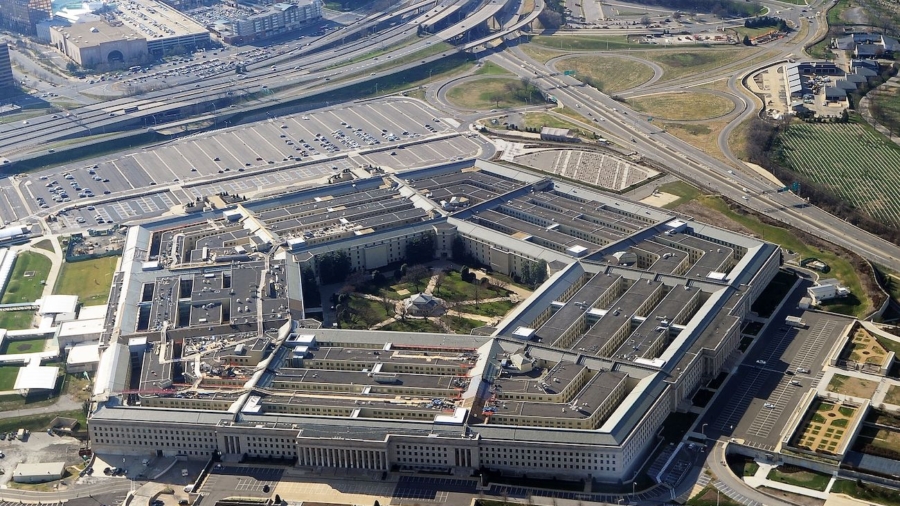Five U.S. senators, including two Democrats, two Republicans, and independent Sen. Bernie Sanders, are seeking a Department of Defense (DoD) investigation into allegations of price gouging by U.S. arms manufacturers.
A CBS News “60 Minutes” report this week claimed systemic price gouging practices were used by major arms manufacturers such as Lockheed Martin, Boeing, and Raytheon, as well as major spare parts manufacturer TransDigm. The “60 Minutes” report, which followed a six-month investigation, found that the Pentagon’s fixed-price contracts would typically have 12-15 percent profit margins, but that defense contractors would often enjoy profit margins of 40 percent—and sometimes as high as 4,000 percent—through overcharges.
Spurred on by the CBS News report and other past allegations of price gouging, Sens. Mike Braun (R-Ind.), Chuck Grassley (R-Iowa), Elizabeth Warren (D-Mass.), Ron Wyden (D-Ore.), and Bernie Sanders (I-Vt.) wrote a letter (pdf) to Defense Secretary Lloyd Austin, calling for further investigation.
“These companies have abused the trust government has placed in them, exploiting their position as sole suppliers for certain items to increase prices far above inflation or any reasonable profit margin,” the Senators wrote.
The Senators placed added emphasis on these price-gouging allegations in light of the $842-billion budget the DoD is requesting in fiscal year 2024—the largest U.S. defense budget in history despite the United States having concluded the 20-year war in Afghanistan in 2021.
“Almost half of this budget will go to private contractors, underlining the importance of reining in this out-of-control price gouging,” the Senators wrote. “Dollars that are wasted on overpriced weapons or spare parts cannot be spent to counter adversaries or support service members.”
Price Increases
The senators highlighted a previously redacted 2019 Pentagon Inspector General report (pdf) on TransDigm’s contracts, finding that “only one part purchased under one contract was awarded with a reasonable profit of 11 percent,” while “the remaining 112 contracts had profit percentages ranging from 17 to 4,451 percent for 46 parts.”
The “60 Minutes” report detailed one instance in which U.S. Army Apache attack helicopters could not operate without a crucial valve. TransDigm had reportedly taken over the manufacturer of this key aircraft component, and subsequently raised its price by $747—an almost 40 percent increase.
The price gouging allegations also factor into the cost U.S. taxpayers are paying to support Ukrainian forces in their ongoing fight with Russia. Near the start of the war in Ukraine, the United States and its allies began sending tons of man-portable anti-aircraft missiles, like the FIM-92 Stinger produced by Raytheon. Shay Assad—a former contract negotiator for Raytheon who later served as a DoD contract negotiator under Presidents George W. Bush, Barack Obama, and Donald Trump—told CBS News the cost for a Stinger missile had been around $25,000 in 1991, but had risen to more than $400,000 during the Ukraine conflict.
The price increase on the Stinger missile represents a seven-fold increase—even when accounting for inflation and improvements in the weapons systems, CBS News reported.
Assad said he had previously called out overpricing on the Patriot missile defense system, another weapons system now seeing use in Ukraine. Raytheon, Boeing, and Lockheed Martin have all played a part in the development of this weapons system.
Army contract negotiators said Raytheon had exaggerated the cost and hours it took to build the radar and ground equipment for the Patriot system, thus inflating its price.
NTD News reached out to Raytheon for comment, but the firm did not respond by the time this article was published. Raytheon did tell CBS it is working to “equitably resolve” the Patriot pricing issue. In 2021, Raytheon CEO Gregory Hayes told investors the company would set aside $290 million for probable liability.
In their response to an NTD News request for comment, a Lockheed Martin spokesperson said the firm “constructively and ethically works with the U.S. government to support its national defense, intelligence, and international security cooperation objectives.”
“We negotiate with the government in good faith on all our programs to meet its mission needs with the best and most effective technologies and systems in compliance with Federal Acquisition Regulations and all other applicable laws,” the Lockheed Martin spokesperson added in an emailed statement.
NTD News also reached out to Boeing and TransDigm, but neither firm had responded by the time this article was published.
The Pentagon’s Accounting Woes
The price gouging allegations raised by the “60 Minutes” report fit into a pattern of DoD accounting struggles.
Last week, the DoD identified an accounting error that led the department to overestimate the value of weapons sent to Ukraine by at least $3 billion. In November, the DoD failed its fifth consecutive audit.
“Unfortunately, this recent investigation only underlines long-standing concerns around the Department’s inability to pass an audit, accurately track its finances, or mitigate against fraud risk in the hundreds of billions of dollars in contracts it awards every year,” the letter from the five Senators states. “Earlier this year, the Government Accountability Office (GAO) reported that DOD accounting systems cannot generate reliable and complete information and are unable to even capture and post transactions to the correct accounts, in violation of statutory requirements.”
In 2020, the DoD Office of Inspector General reported that about one in five of its ongoing investigations related to procurement fraud. An August 2021 GAO report found only limited participation by DoD components in the department’s Fraud Reduction Task Force, and determined the DoD “could more thoroughly assess and report department-wide fraud risks.”
“The DoD can no longer expect Congress or the American taxpayer to underwrite record military spending while simultaneously failing to account for the hundreds of billions it hands out every year to spectacularly profitable private corporations,” the Senators concluded in their letter.
“We ask that you please provide us an update on the Department’s efforts to implement outstanding GAO recommendations related to financial management and fraud risk reduction, as well as your efforts to investigate the price gouging uncovered by CBS’s recent reporting.”

